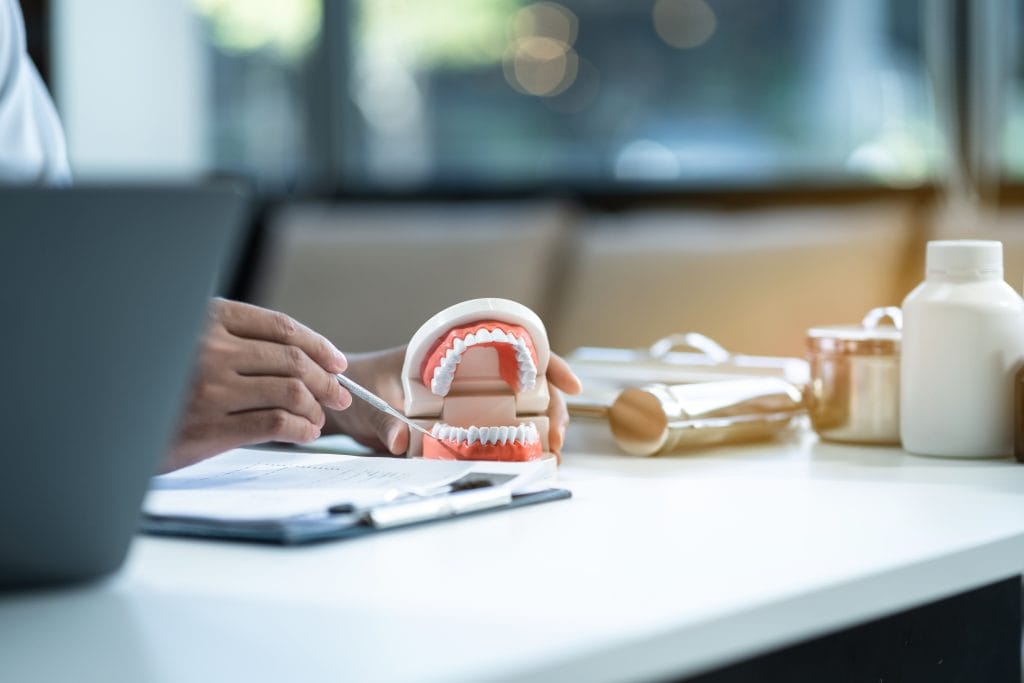Last updated on May 9th, 2023 at 05:25 pm
 Are you happy with the organizational systems in your office?
Are you happy with the organizational systems in your office?
If you’re like most of your colleagues that I’ve met the past fifteen years I’ve been in the industry, you’d probably say “no.” For that matter, since I’ve been with MGE, I could count on one hand the number of doctors (before doing the MGE program) that answered “yes” to this question!
Fact: most dental practices are owned by a stressed-out dentist (or dentists) scrambling to produce and just hoping they can find a few good staff to keep things together up front.
The sad part of this is that it doesn’t have to be this way.
(Related: The 4 Most Common Mistakes When Hiring Employees)
At MGE, we’ve helped thousands of clients organize their practices effectively so as to achieve steady, consistent growth (without big swings in production from month to month), along with building a productive team which takes the majority of the load off the doctor. All of this of course adds up to increased efficiency (and profit) with reduced stress.
In the MGE Quality Control Department, it’s my job to make sure clients are producing the expected results (for real) in their offices. And with that in mind, I’ve seen just about every organizational problem a dentist can have. Here are my “Top 4”:
(Related: Solving the Biggest Problem in Your Dental Practice)
1. Failing to define the distinct areas and functions of your practice.
 I have a question for you: what do you do when you arrive at the office first thing in the morning?
I have a question for you: what do you do when you arrive at the office first thing in the morning?
Take a quick glance at the schedule and get started with the first patient?
Perhaps a quick morning huddle to make sure everyone’s there and ready to start the day?
There’s your first mistake.
(Related: Why Your Practice Needs to Be Systems Based)
Production doesn’t just occur magically. There are multiple functions in a dental practice that need to occur in order to have adequate production (and collections). Of course, you know this. That’s why you have a front desk, an office manager, a scheduler, etc. But odds are, you aren’t defining these functions or monitoring them as well as you should be.
What needs to happen in order for production to occur? Well, there’s new patient marketing, scheduling, recall programs, hygiene production, doctor’s production, treatment coordination (case acceptance), billing, accounting…and so on.
If all of this is just loose in your mind, only given attention whenever you remember or “have the time” throughout the day, of course your office is going to be a mess organizationally! And of course production is going to be unpredictable from day to day or month to month.
(Related: 6 Steps to a Productive Hygiene Department!)
You should be able to, in just a few minutes in the morning, review all of the important functions of the practice and instantly have a view of exactly how each area of the practice is doing and what the forecast is for future productivity (and income).
In order to do this, you need to assign each function to a staff member, and then track that function. The person in charge of new patient flow should be tracking the number of new patients, the scheduler should track the amount of production on the schedule (in a dollar amount), and so on. Then in the morning each of these functions can be reported to you, and you’ll know if there isn’t enough production on the schedule in the upcoming day or week, and be able to do something about it before it kills your bottom line. You’ll know that there aren’t enough new patients coming in that month. You’ll know if the recall program isn’t actually getting done consistently before the hygiene schedule empties out.
You can only plan intelligently if you know these things.
(Related: Why Your Staff Don’t Listen to You)
At MGE, we can help you lay out the functions of your practice, organize your staff accordingly, and teach you how to monitor them effectively. Check out the MGE Power Program to learn more.
2. Looking for a “script” or “system” that will handle everything for you.
Look, we all want something that will just run on automatic and work without us having to think about it. It’s fantastic to have automated appointment reminders, practice management software, recall programs, and so on. But the fact is you’ve still got to have a living breathing person in charge, making sure things actually happen.
I’ve spoken with so many doctors who are using a new patient referral system and automated appointment reminder texts/emails, who still have an empty schedule with tons of cancellations/no-shows. Then they say, “But I’m using these services!”
The problem isn’t necessarily the services. Appointment reminder texts are good. But a live person still needs to be there when the technology malfunctions or too many people cancel anyway (despite the reminders) and to do something about it before it’s too late. If the only person who really monitors and tries to exert control on these things is the dentist, then you have a problem—which brings me to my next mistake:
(Related: The Difference Between Lowe’s and Home Depot and How This Applies to Your Dental Practice)
3. You (the dentist) trying to do everything yourself.
 Want to overwork yourself until your hair falls out and you burn out twenty years before you planned to retire? Then try to do every administrative function of a dental practice and make every decision yourself, in addition to doing all of the clinical work.
Want to overwork yourself until your hair falls out and you burn out twenty years before you planned to retire? Then try to do every administrative function of a dental practice and make every decision yourself, in addition to doing all of the clinical work.
It’s impossible. It can’t be done.
If everybody in the office comes to you to solve every little problem, make every decision, or get permission from you to do things that should just be a part of their usual job… then get ready for a stressful career.
(Related: Why Must Doctors Be Able to Sell Dentistry?)
If you have delineated the various functions of the organization as I covered in point #1 above, then you should assign these functions to individual staff members. If you have a smaller practice, then one staff member may be in charge of multiple functions, but the point is that somebody is accountable for it. They should keep track of it, make sure it goes along successfully, handle any problems that arise themselves and make every-day decisions as appropriate.
If you just read that and thought, “Oh no, I couldn’t just let my staff run all these things!” Then you need to see my next mistake:
4. Not delegating jobs to your staff.
Some tasks aren’t able to be delegated. These you keep. But if I were to bet, you are still doing a number of things that you could delegate. Why? Usually, this is a trust issue. You don’t trust your staff to handle things without you.
Why is there a lack of trust?
(Related: 4 Profitability Killers in a Dental Practice)
Of course, it could be the case that you have great staff who are real pros at their jobs, but you simply have a hard time letting go. In which case you’d just have to get over your trust issues and let them spread their wings.
But most often, the problem is that the staff members actually don’t handle the job well enough on their own.
This could be because you’re hiring staff that aren’t a good fit for your office—so if you feel you have a hard time finding good staff, see our articles on finding and hiring quality staff.
But more commonly, the problem has to do with the way you train and apprentice staff to get them onto their job properly. You should be using ddssuccess.com to train your staff, and then apprenticing them on the job until they can do it competently and you can allow them to handle the functions they’re responsible for without worrying. 
Sometimes I’ll speak with a dentist who sees a resume with what seems like good dental experience, hires them, and then a several months later they’re telling me, “I don’t know if they’re doing a good job…” I just think, what do you mean you “don’t know”?! They never actually look to see what that staff member is doing and honestly evaluate their performance. And before that, the doctor never actually apprenticed them (or had a senior staff member apprentice them) to teach them how to do their job. And usually they also didn’t have any training manuals that lay out what the new employee is supposed to do and exactly how to do it.
(Related: Try This in Your Dental Practice: Lunch & Learn With Your Staff)
In this scenario, the doctor just assumed that the new employee would know what to do because they’d worked in a dental office before, or explained things half-way when he or she had time between patients, and then left them without any more guidance.
So if you have trouble delegating, this is most likely the issue—because I’ve almost never met a dentist (or any business owner, for that matter) who puts enough focus on staff training. Now that ddssuccess.com is available to you, there’s really no excuse for not training every team member and delegating all the functions you don’t absolutely need to be doing yourself. Over the next few months, we’ll be adding courses to DDS Success that will include step-by-step instructions for all non-clinical aspects of each job in the office, including answering the phones, filing insurances, arranging finances, collections, scheduling, managing staff, etc.
Summary
There’s a lot that goes into organizing a dental office efficiently. Just the subject of hiring and managing staff could fill a book. To get a real handle on it—so you have a long, profitable, and low-stress career—give us a call and get started on the MGE Program. That’s the long-term solution. But fixing these four mistakes should get you on the right track.
I hope this helps!


No Comments
Be the first to start a conversation